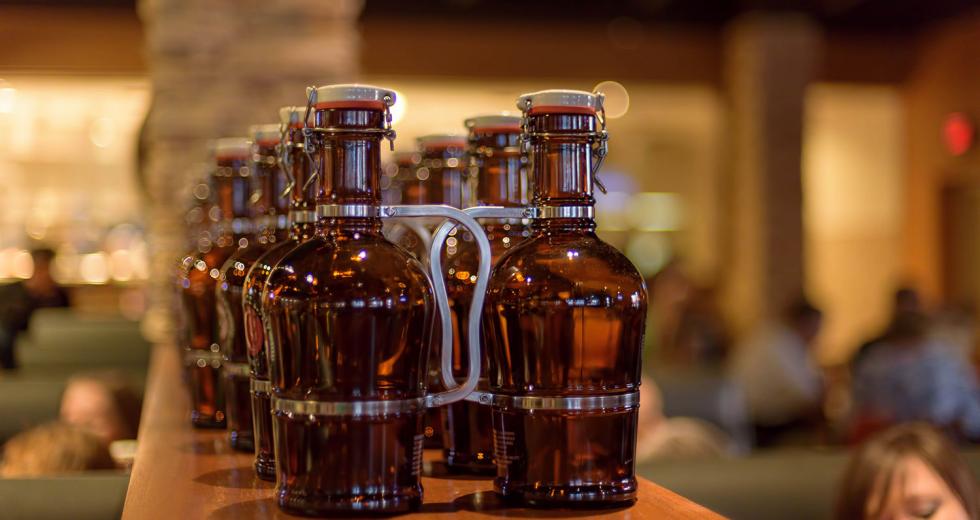In a semi-industrial pocket of East Sacramento near Sacramento State, a mantel runs along the wall behind the bar of Tower Brewing Company lined with a collection of mostly brown glass growlers from different beer makers. The collection represents a simple idea: If you visit a brewery, like its beer and want to take a substantial amount of it home, a growler is ideal.
A growler holds 64 ounces (4 pints). “A lot of people will come and they’ll try one of our beers and like it and they’ll take some home for maybe a barbecue,” says Calvin Crawford, a former homebrewer and the taproom manager at Tower Brewing, which recently changed its name from Sactown Union Brewing.
Growler clubs have been common for more than 20 years, and as more microbreweries open in the Capital Region, more growler clubs have been launched. Breweries say the clubs are a good way to compete in the expanding marketplace because they encourage repeat customers. Customers have the option to pay a flat rate for a stainless steel canteen and a predetermined number of refills. Some clubs even include brewery merchandise. Sacramento-area breweries offer their products in growlers or crowlers, 2-pint aluminum cans that are filled onsite.
Growlers were the beer-carrying containers of preference in the late 1800s. While the origin of the term growler is debatable — a prevailing thought is that it’s derived from the grumbling sound suds made in galvanized steel buckets — not much happened with modern growlers until 30 years ago when the founders of Grand Teton Brewing, brothers Charlie and Ernie Otto, began to offer customers beer in Wilson, Wyo., in glass growlers, relaunching the trend.
After a recent rebranding, Tower Brewing decided to re-establish its growler club this spring as a way to draw attention to its new design. The brewery now has more than 100 members, who pay $295 for an annual membership that includes a growler and 24 refills from among its 16 beers on tap — a 17th tap has carbon dioxide, which is added to keep beer fresh longer in the containers.
Porchlight Brewing Company in East Sacramento has a similar growler club. “Beer in growlers is cheaper,” says Scot Taylor, a bartender at Porchlight. “On Wednesdays, we do $10 refills. We pick three of our beers, and we allow people to bring in an empty growler and refill. It’s basically about $2.50 per beer.” Porchlight Brewing, which opened in 2017, has options for its growler club, but its basic membership is $425 for a growler, 52 refills and a T-shirt.
Track 7 Brewing, with locations in Curtis Park, Natomas and East Sacramento, has a sold-out growler club, according to its website. Sign-ups are yearly in October and available only via lottery. The $599 cost includes two refills per week for a year. The club also has a variety of perks — invitations to beer debuts, a customized growler and other merchandise.
Breweries say the clubs are a good way to compete in the expanding marketplace because they encourage repeat customers. Customers have the option to pay a flat rate for a stainless steel canteen and a predetermined number of refills. Some clubs even include brewery merchandise.
Several other regional breweries have less expensive options. Knee Deep Brewing Company in Auburn offers an annual 12-refill plan for $215. Yolo Brewing Company in West Sacramento has a six-growler plan for $99, including a logoed growler.
Not all customers find benefit in growler clubs. “When you open up a growler, you’re committed to finishing it,” says Jason Lira of Sacramento, a customer one recent afternoon at Capital Hop Shop in downtown Sacramento. “I was a member of the Bike Dog [Brewing Company] growler club, and it became more of an effort to get through it, rather than just enjoy it.”
Lira says he used to buy a lot more growlers until crowlers became popular. “A crowler allows you to get half the size for almost the same price [break],” Lira says. “And you don’t have to be forced to finish it within a few days.”
Maintaining beer freshness can be a downside to purchasing a growler or membership in a club. “A lot of people learn the hard way that you have to drink the beer fairly quickly,” Porchlight’s Taylor says. “When you open it, it’s like a bottle of 7UP. If it sits in the fridge too long, it becomes completely flat. You have to be dedicated to it.”
Still, local breweries see the value and versatility of growlers and crowlers, says Crawford of Tower Brewing, and plan to keep offering these memberships. “It’s funny, we can be super busy, and it’s like Murphy’s law, and all of a sudden there’s three or four people wanting to have their growlers refilled,” Crawford says.



